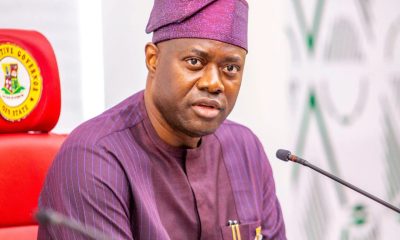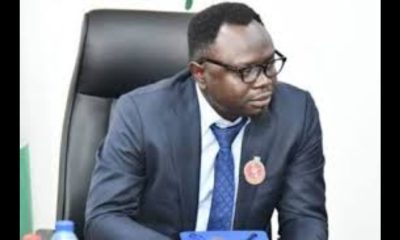Economy
Buhari Faults Nigeria’s Multiple Tax System

By Joseph Amah, Abuja
President Muhammadu Buhari has faulted the nation’s current multiple and overlapping tax system, saying it’s inefficient and creates uncertainty and instability.
The president, therefore, canvassed for efficient tax administration to boost the nation’s revenue base.
Speaking on Tuesday while declaring open the second annual National Tax Dialogue Week at the Conference Hall of the State House, Abuja, the president said he was worried at the current tax system in the country, characterised by fragmented administration, multiple and sometimes, overlapping taxes.
According to him, “Multiplicity of tax administration is as undesirable as multiplicity of taxes; it creates uncertainty and instability; and above all, it is inefficient.
”He, however, expressed his administration’s commitment to an efficient tax system in order to improve tax revenue in the country.
“In most tax-efficient nations, tax administrative processes and practices are harmonised within a single system.
”One key deliverable of this year’s tax dialogue is to promote synergy in tax administration among the different tiers of government.
”Harmonising taxpayer identification across the country is a good start; but we must do more to promote ease of doing business (including ease of tax compliance) in Nigeria.
“On our part, we have started by clarifying in the 2021 Finance Act that FIRS is the sole authority to administer tax for the federal government.
“This clarification became necessary in order to avoid taxpayers being burdened with multiple tax compliance obligations towards different agencies of the same government,” the president said at the dialogue with the theme ‘Tax Harmonisation for Enhanced Revenue Generation.’
In the face of dwindling revenues from commodities, President Buhari told participants at the tax dialogue that there is an urgent need to maximise domestic revenue within the extant tax policy and laws.
He, therefore, proposed improved tax revenue for the country which will not necessarily impose new tax rates on Nigerians.
“We all know that good intentions are not enough as they simply cannot pay for infrastructure, security or social amenities. We must therefore improve tax revenue without necessarily raising new taxes.
“Revenue from commodities, including crude oil, are too volatile and unreliable. Therefore, I pledge government’s support for any viable initiative for improving tax revenue that should emanate from this dialogue,’’ he said.
On Nigeria’s Tax-to-GDP ratio, the president declared that the country also needs to do more in securing a buoyant domestic revenue base for the country that bequeaths an enduring economic foundation, political stability and social harmony to the next generation.
“According to the Organisation of Economic Cooperation and Development (OECD), in its Revenue Statistics in Africa 2021, the average ratio of Tax-to-GDP of 30 selected African countries in 2019 was 16.6%, while Nigeria recorded a mere 6.0%.
“It is obvious that much needs to be done in the area of tax revenue mobilisation.
“It is my expectation that the discussions at this 2022 National Tax Dialogue will be focused on what we must do to maximise legitimate revenue collection and massively improve the Tax-to-GDP ratio,” he said.
On the importance of the tax dialogue, which was instituted by the Minister of Finance, Budget and National Planning, and the Executive Chairman, Federal Inland Revenue Service (FIRS), President Buhari noted that the first edition in 2021 was very productive and integral in influencing tax policy, as well as legislative and administrative changes that were introduced last year.
He added that the most important testament to the success of the first edition is the fact that the FIRS achieved 100% of its collection target in 2021 and surpassed N6 trillion revenue threshold for the very first time.
Congratulating FIRS on the achievement, the president assured Nigerians that the present administration would continue to maintain prudent management of the collective resources.
The Minister of Finance, Budget and National Planning, Zainab Ahmed, said the dialogue was designed to engage stakeholders in the Nigerian tax-space in meaningful discourse so as to glean information, ideas and experience in the aid of policy formulation and improved tax environment.
According to her, the main tax revenue objectives of the federal government include developing an economy that does not lean too heavily on resource wealth.
She explained that Nigeria’s economic history provides enough facts that resource wealth alone cannot lead to sustainable development and self-sufficiency.
She said: “The other tax revenue objectives are: to institutionalise a healthy tax culture among Nigerians. The right attitude towards taxation will enable every Nigerian to become a co-guardian of the tax system and the commonwealth.
“To create a participatory system of taxation whereby the taxpayers and other stakeholders understand and accept that they have equal stakes in the tax system.”
Also speaking, the Chairman of FIRS, Muhammad Nani, thanked the president for his directive to government agencies to enable FIRS connect to their ICT systems, noting that this singular pronouncement softened the grounds for the service to roll out its system for seamless acquisition of data.
He said: “We are confident that by the time all the agencies achieve 100% compliance with the president’s directive, Nigeria shall be the envy of other countries for tax compliance and domestic tax revenue mobilization.”
On the remittances of the service to the Federation Account, Nani announced that statistics from March 2022 Federation Account Allocation Committee (FAAC) meeting showed that out of a total revenue of N803.072 billion from all revenue agencies, tax revenue contributed by FIRS was N513.522 billion (63.94%), while non-tax revenue from all other agencies amounted to N289.55 billion (36.06%).
He noted that the average tax or FIRS contribution to FAAC in 2021 was 59.45%.
”I mentioned in my welcome address to the 2021 edition of the tax dialogue that the world had begun a tax race of which Nigeria must be a winner.
“The revenue profile of the country in 2021 has clearly shown that our continued survival as a nation depends on tax revenue.
”This trend is set to continue for some time to come. As such, all hands must be on deck to support the tax system and make it function efficiently.
“However, it is surprising that some people have begun to play politics with tax revenue generation.
“We humbly invite the president to step in to dissuade political tax gladiators to sheath their swords. Tax revenue is an inherently apolitical issue; it should be treated as such by all, irrespective of their political leaning,” the FIRS Chairman said.
Economy
Tinubu’s Democracy Speech Reflects Ambitious Vision – LCCI

The Lagos Chamber of Commerce and Industry (LCCI) says President Bola Tinubu’s Democracy Day speech reflects an ambitious and optimistic vision for Nigeria.
In a statement in Lagos on Thursday, the Director-General of LCCI, Dr Chinyere Almona, said the speech showed government’s appreciation of democracy, economic development, security and social cohesion.
Almona said that the President’s focus on economic growth, improving security, and increasing funding for education, healthcare, and infrastructure promised improved economic performance in the near future.
“We join all Nigerians to celebrate the peaceful transition and commitment to democratic values in the past 26 years.
“A stable political environment is very crucial for business success and for attracting investments.
“Government must stay committed to executing all its proposed programmes and ongoing reforms to ensure Nigerians reap the benefits of democracy without further delay,” she said.
The director-general also urged the government to ensure clear and consistent communication about economic reforms and policies to businesses and the general public.
This, she stated, would reduce uncertainty, build confidence and establish transparent mechanisms for tracking and reporting progress made through reforms.
Almona also called for targeted support for businesses to reduce their cost burdens relating to energy, logistics and regulatory compliance.
She said that LCCI recommended non-cash interventions that could ease the harsh production environment.
Almona also advocated expansion of social safety net programmes to support households affected by high living costs and inflation.
She also called for a more collaborative environment among government, businesses, the civil society and labour unions to ensure fair and timely negotiations on wages and working conditions.
She said that the government must implement programmes that would support strategic sectors pivotal to job creation, tax revenues and infrastructure development.
According to her, the oil and gas, power, and agriculture sectors require special attention as they offer catalytic support to the economy.
“As Nigeria reflects on the progress made and the path ahead, we urge government to remain steadfast about implementing all the required reforms toward a more sustainable and resilient economy.
“We call on government to work toward a nation built on the rule of law, justice and social cohesion even in our diversity and political sophistication,” she said. (NAN)
Economy
World Bank Cuts Global Growth Forecast to 2.3% for 2025

Global economic growth is projected to slow to 2.3 per cent in 2025 due to mounting trade tensions and persistent policy uncertainty, according to the World Bank’s latest Global Economic Prospects report.
A statement from the bank’s Online Media Briefing Centre on Tuesday noted that the new forecast was nearly half a percentage point lower than the rate projected at the beginning of the year.
The report indicated that the slowdown would mark the weakest non-recessionary global growth since 2008.
“The turmoil has resulted in growth forecasts being cut in nearly 70 per cent of all economies, across all regions and income groups,” the report states.
In spite of the gloomy outlook, a global recession is not anticipated. However, if current projections hold, average global growth in the first seven years of the 2020s would be the slowest of any decade since the 1960s.
Indermit Gill, the World Bank Group’s Chief Economist and Senior Vice-President for Development Economics, warned of deepening stagnation in the developing world.
“Outside of Asia, the developing world is becoming a development-free zone. It has been advertising itself for more than a decade,” he said.
Gill noted that growth in developing economies had declined steadily, from 6 per cent annually in the 2000s, to 5 per cent in the 2010s, and to under 4 per cent in the 2020s.
This trend mirrored the slowdown in global trade, which fell from an average of 5 per cent in the 2000s to under 3 per cent today. Investment growth had also weakened, while debt had surged to record levels.
The report projected that growth would slow in nearly 60 per cent of developing economies in 2025, averaging 3.8 per cent before a modest rise to 3.9 per cent in 2026 and 2027.
The report added that more than a full percentage point below the average of the 2010s.
“Growth in low-income countries is expected to reach 5.3 per cent in 2025, a 0.4 percentage point downgrade from earlier forecasts.
“Tariff hikes and tight labor markets are expected to keep global inflation elevated, with a projected average of 2.9 per cent in 2025, still above pre-pandemic levels.”
The World Bank warned that slowing growth would hinder efforts by developing economies to create jobs, reduce poverty, and close the income gap with advanced economies.
“Per capita income growth in these economies is forecast at 2.9 per cent in 2025, 1.1 percentage points below the 2000–2019 average.
“Assuming developing countries (excluding China) maintain a GDP growth rate of 4 per cent the forecast for 2027, it would take them about two decades to return to their pre-pandemic growth trajectory.”
Still, the report noted that global growth could rebound more quickly if major economies reduced trade tensions.
It said that resolving current disputes and halving tariffs could boost global growth by 0.2 percentage points over 2025 and 2026.
In response to rising protectionism, the World Bank urged developing economies to diversify trade, pursue strategic partnerships, and engage in regional agreements.
Given constrained public resources and growing development needs, policymakers are encouraged to mobilise domestic revenue, prioritise spending for the most vulnerable, and enhance fiscal management.
To drive sustainable growth, the report emphasised the need to improve business environments, expand productive employment, and align workforce skills with market demands.
Finally, it highlighted the importance of global cooperation in supporting the most vulnerable economies through multilateral initiatives, concessional financing, and targeted relief for countries affected by conflict.(NAN)
Economy
Eid-el-Kabir: Ram Sellers Decry Low Patronage as Prices Soar in Ile-Ife

The Chairman, Ram Sellers’ Association, Odo-Ogbe Market, Ile-Ife, Osun, Alhaji Akeem Salahudeen, has complained of low patronage, attributing it to high cost of rams and the economy situation in the country.
Salahudeen stated this in an interview on Wednesday in Ile-Ife.
He said that the big sized ram which was sold between N550,000 and N620,000 last year are now being sold at the rate of N800,000 to N1.
2 million.He added that the medium sized ram which was sold between N300,000 and N350,000 last year is now going for between N450,000 and N550,000.
According to him, small sized ram sold for N200,000 and N230,000 last year now attracts N300,000 and N450,000 this year.
He attributed the increase in the prices of rams in this year’s Sallah to the insecurity in the North, which he claimed had disrupted the supply chain.
“They said the worsening insecurity in the North has forced some sellers to import rams from neighbouring countries like Niger, Mali and Chad, which they said contributed to the high prices,” he emphasised.
At Sabo Cattle Market in Ile-Ife, Alhaji Saheed Yaro, said that the price of rams has surged as the small sized ram which was sold at N150,000 and N180,000 last year, is now being sold between N250,000 and N350,000.
Yaro added that the price of medium sized ram which was between N185,000 and N260,000 last year now goes for between N350,000 to N450,000.
Accordingly, the big sized ram sold between N480,000 and N500,000 last year is now between N550,000 and N780,000.
At Boosa Cattle Market located at Modakeke, Mr Musa Salami stated that prices of rams have witnessed sharp increase with a medium sized ram which was for N170,000 to N200,000 last year is now at N250,000 to N300,000.
Salami stated further that the big sized ram that was sold at N350,000 and N400,000 is now being sold at N600,000 to N750,000.
He added that he brought 150 rams a week ago, but has been able to sell only 15, explaining that many customers turned back on hearing prices without buying.
He noted that customers who usually bought rams from him over the years are now complaining about costs.
NAN reports that ram sellers expressed concern over low patronage in many markets, saying that customers were lamenting the high cost of the animals.
A civil servant, Mr Bayo Olabisi, said that most workers in the state cannot afford to buy rams for this year’s Eid-el-Kabir due to the high prices and the economic hardship.
Olabisi added that the present economic hardship has been taken a toll on the workers, especially with the high transportation and other costs following the removal of fuel subsidy by the government.
“In fact, I visited three places where they sell rams, but I couldn’t buy any because I can’t afford to buy.
“When I priced a medium sized ram, the seller told me N250,000, the same size of ram I bought for N150,000 last year.
“I would rather use part of my salary to buy half bag of rice and two chickens for my family.
“For Allah has said that if you can’t afford ram, you should not borrow or buy on credit because there’s no reward on that,“ he said. (NAN)




















